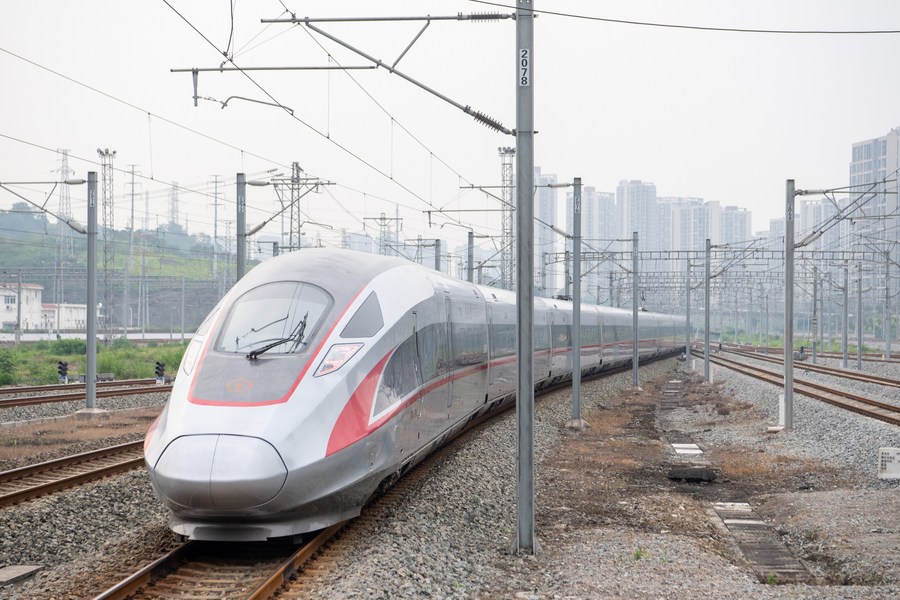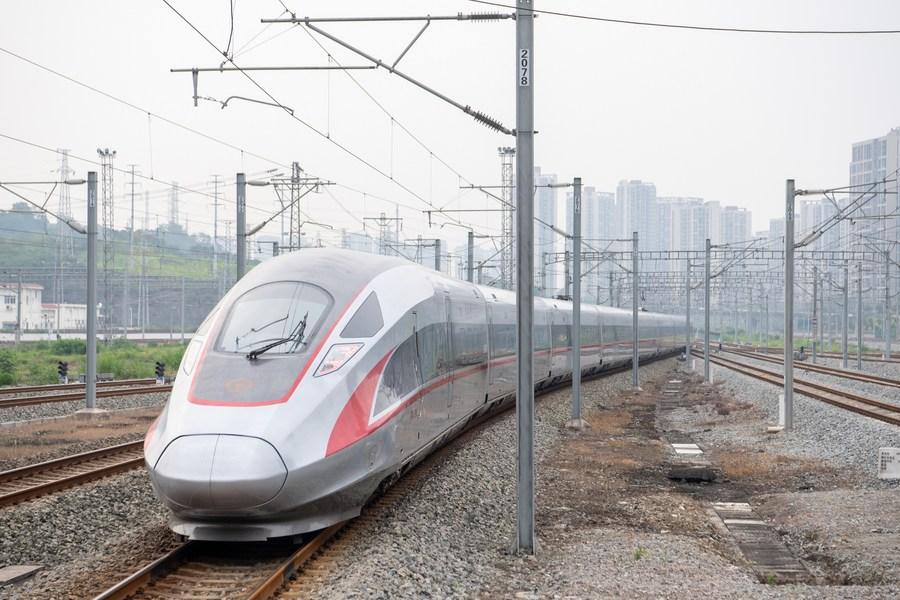
Train G52 departs from Chongqing North Railway Station in southwest China's Chongqing Municipality, June 20, 2022. (Xinhua/Tang Yi)
CHONGQING, June 20 (Xinhua) -- With a new section launched on Monday, a high-speed railway line that passes through the area best known for the Three Gorges Reservoir has been fully operational in China.
With a total length of 1,068 km, the high-speed railway links southwest China's Chongqing Municipality and Zhengzhou, the capital of Henan Province, as well as passing through central China's Hubei Province.
The new 434-km section that opened on Monday links Hubei's Xiangyang and Chongqing's Wanzhou. Two other sections along the railway were previously opened in 2016 and 2019.
The line allows the travel time from Chongqing to Zhengzhou to be shortened from around 8 hours to 4 hours 23 minutes at the top speed, while the shortest time from Chongqing to Beijing will be cut from more than 20 hours to less than 7 hours.
Traversing various mountains, rivers and primaeval forests, it is believed to be one of the most challenging railways in China's high-speed rail network.
With a top speed of 350 km per hour, the new section features 91 bridges, 57 tunnels and 10 stations. Among them, two single-hole double-track tunnels are among the longest in Asia, one with a total length of 18.95 km and the other extending 18.79 km.
Since the Xiangyang-Wanzhou section runs through the Three Gorges Reservoir area, which boasts rich natural resources like rivers, wetlands and grasslands, the conservation of the ecological environment was prioritized in the construction process.
"We initiated the reconnaissance and design work in 2008 and always made protection of the environment the priority. For example, during the route selection, the tunnel projects should be as far as possible from the Yangtze River," said Xiao Qiang, deputy chief engineer of the Chongqing branch of the China Railway Eryuan Engineering Group Co., Ltd.
In addition, a variety of measures were taken during the construction process to promote water and soil conservation.
Xiao added that sites where construction residue was dumped must be recultivated into orchards or arable land, which not only reduces the impact on the environment, but can also create new agricultural businesses for local farmers.
The route takes in six cities each with a population of over 5 million people. Three of them have more than 10 million residents. The Zhengzhou-Chongqing high-speed railway is expected to boost the flow of people and goods among the regions, especially in the Three Gorges Reservoir area.
In 2019, when high-speed trains were not accessible to people in the Three Gorges Reservoir area, which covers the Yangtze River in Hubei and Chongqing, it received over 300 million tourists and garnered a tourism income of 271 billion yuan (about 40.5 billion U.S. dollars).
Experts believe that the Three Gorges area will see a boost in tourism due to the improved rail services.
Among the locations likely to benefit from the high-speed connection is Chongqing's Fengjie County on the banks of the Yangtze River, where a new railway station has been built.
Li Li, a 22-year-old college student hailing from Fengjie, feels confident the area will receive more visitors in the future.
She said her hometown's mountain and river views are well-known in the country, even featuring on Chinese banknotes, providing a very good foundation for the development of local tourism.
More and more people will come to enjoy Fengjie's poetic views, she said, while the high-speed connection brings Beijing closer, together with her ambition of working in the capital after graduation.




 A single purchase
A single purchase









